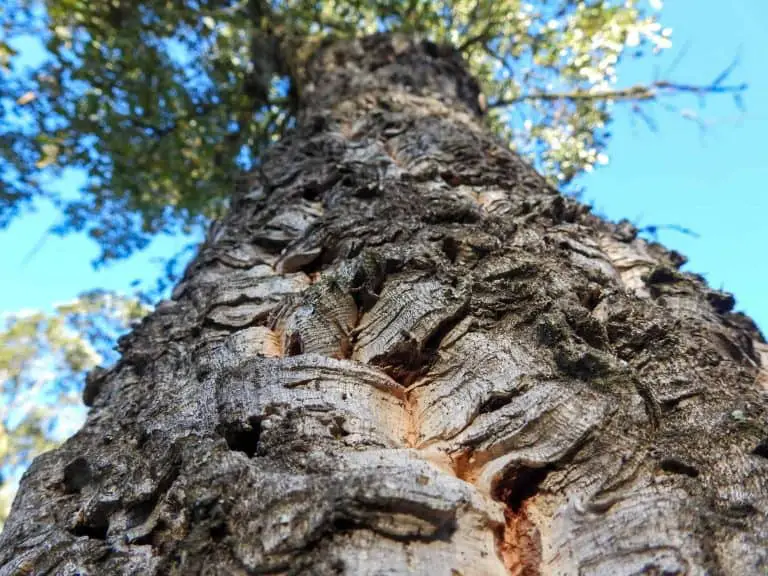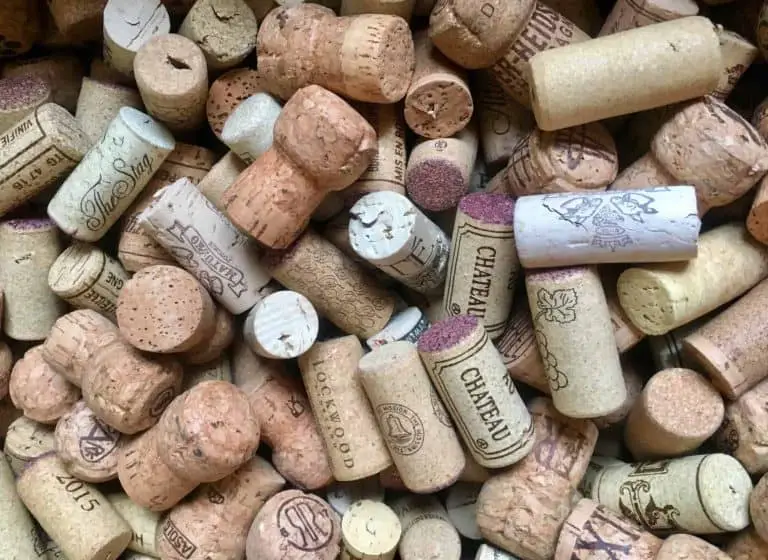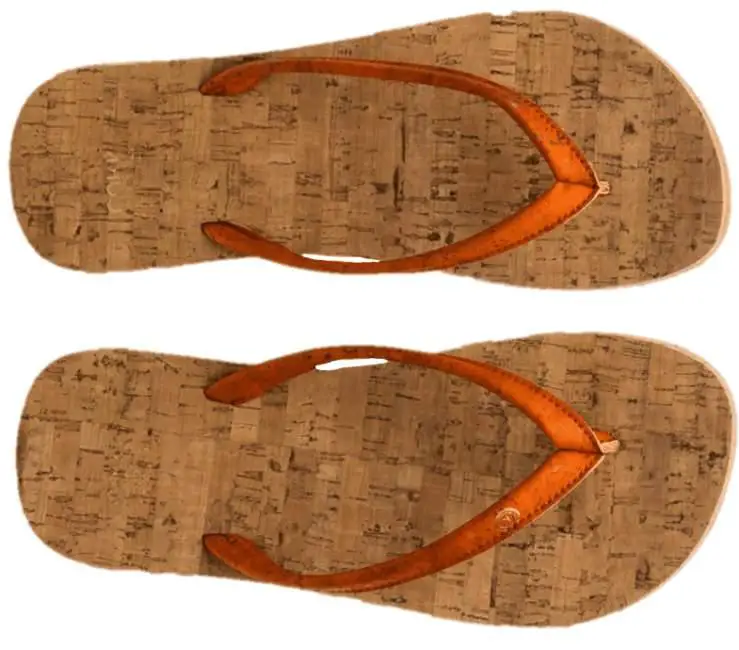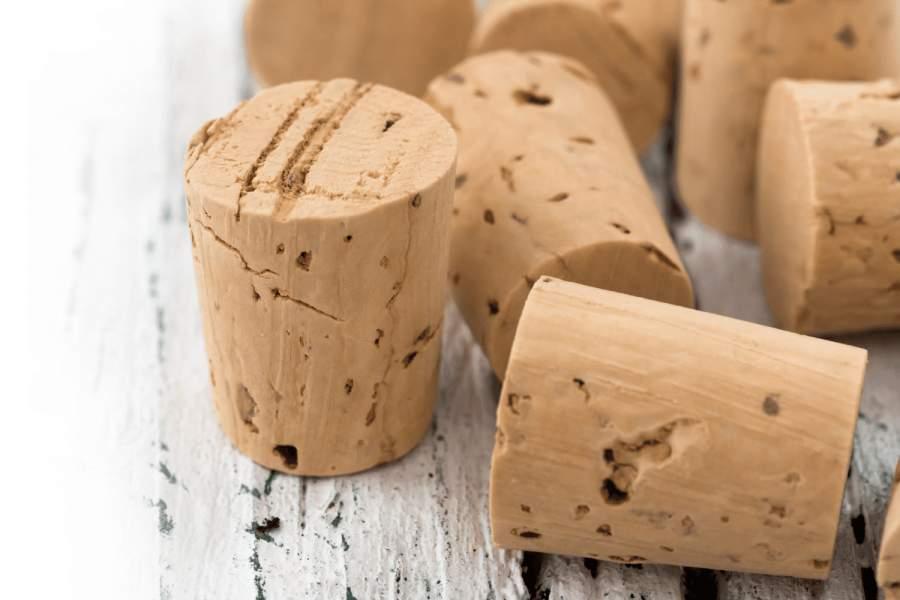More companies than ever are vowing to make their products eco-friendly. Over the past few years, products such as cork shoes, flooring, and yoga mats have started to pop up frequently.
But what is cork exactly? Is this yet another case of greenwashing? Is cork really that sustainable?
I take a look at the wider implications of cork and its alternatives.
What is cork made of?
Cork is made from the bark of cork oak trees (also known as Quercus suber). The cork bark is hydrophobic, which means that it repels water.
Cork trees can only be manually harvested for bark once every nine years. During this process, labourers delicately peel the cork from the trees using large axes.

After being picked from the trees, the bark is placed on pallets ready to be boiled. The boiling process helps to soften and clean the bark. Finally, the cork is flattened, graded and cut into smaller more workable pieces.
Does harvesting cork kill the tree?
So, you may be thinking great, cork is natural and all, but what about the trees? The good news is that harvesting cork does not damage the tree in any way. When harvesting the cork, skilled labourers take great care to ensure the living part of the tree is not damaged. The cork trees are not cut down, but pried of their outside layer in a strangely satisfying way.
Cork trees undergo an initial 25 years of growth, after which they’re able to be harvested every nine years. The total lifetime of a tree can be up to a staggering 300 years, providing the harvesters with over 1.5 tonnes of cork (40kg – 60kg per harvest depending on the size of the tree).
As well as being regenerative, the trees also require minimal resources to grow. There’s no need for things like fertilizer, pesticides, or pruning. This results in the cork having a minimal carbon footprint compared to many other materials.
Once a cork oak tree has been stripped of it’s bark, it absorbs 3-5x more CO2 than usual in order to aid the regeneration process.
Wine corks vs screw caps
As wine corks make up around 2/3rds of the total cork market, it makes sense to explore their use in a little more detail.
The debate on whether natural cork or screw caps are the best for holding wine has been widely discussed within the wine industry. However, the debate rarely focuses on the environmental impact or the stopper, instead focusing on the taste and preservation of the wine.

Interestingly, an Oxford study found that cork is the best option to seal wine with, but not because of sustainability, flavor, or smell. Instead, the study suggested that it is the sound of the cork that makes the drink taste better.
From a purely ecological point of view, the traditional cork is a clear winner. Here’s why.
Screw tops are not efficiently recycled, or recycled at all
There’s a lot of conflicting information on whether you can recycle screw tops in your normal recycling collection. Some recycling providers insist the caps are kept on the bottles, whilst others suggest that the caps are too small to be recycled, and others point to recycling as usual.
“At this time there are no recycling centers [in the US] that are actively recycling screw caps or plastic closures, both products are too small and are rejected or fall through the system as “particulate matter”. I’ve found no plastic recyclers who are taking plastic closures.”Patrick Spencer, Executive Director at the Cork Forest Conservation Alliance
In areas where screw tops are accepted, there’s the simple fact that recycling aluminium uses up more energy than being able to compost a natural cork lid.
Corks have the lowest CO2 emissions of any wine closure
According to a research paper conducted by synthetic wine stopper manufacturer Nomacorc, natural cork stoppers use 8g of CO2 per unit, rising to 21g of CO2 per unit for micro agglomerated corks. Screw caps come out last in the study, with an estimated 52g of CO2 per unit assuming a 35% recycle rate.
Cork stoppers aren’t perfect
The wine industry often refers to cork taint as being the primary factor for the transition to screw tops and synthetic stoppers. Cork taint is where the smell and taste of the wine is ruined by a chemical called TCA (2,4,6-trichloroanisole). The chemical is typically found in cork hence the saying ‘my wine is corked’.
Reports of how widespread cork taint is vary significantly, depending on who you ask. The cork industry typically references a 1-2% failure rate, which is a dramatic improvement over the 9.5% failure rate in 2007. Regardless of the true failure rate, the wasted end product and its total environmental impact is rarely taken into consideration.
What about the ecosystems surrounding cork oak forests?
Another valid concern is the sustainability of cork oak trees and their impact on the ecosystem surrounding them. We’re all familiar with the devastating impact oil palm plantations have, wiping out huge areas of rainforest, displacing local people and wildlife, and posing serious climate problems.
Thankfully, cork oak plantations are vastly different to those of oil palm. Cork oak forests are some of the most bio-diverse environments on earth. Endangered species such as the Iberian Imperial Eagle, Iberian Lynx and the Barbary Deer are all dependent on the ecosystem made possible by Cork oaks.
The forests also provide a home for a large number of plant and bird species, including millions of migratory birds from northern Europe.
“In cork oak landscapes, plant diversity can reach a level of 135 species per square metre, and many of these species have aromatic, culinary or medicinal uses.” Cork Screwed: Environmental and economic impacts of the cork stoppers market, World Wildlife Fund
Is cork biodegradable?
Cork material, in its natural form, is 100% natural and biodegradable. If you’re wondering whether wine corks specifically are biodegradable, the answer is a little more complex.
The answer comes down to what additives have been added to bind the cork together. Most corks sold today are bonded with glue, and possibly micro plastics. The good news is that even if your cork product is not 100% biodegradable, there are many cork recycling schemes available.
Can I recycle wine corks?
You may be wondering about recycling options for old corks you have, even if the corks aren’t 100% biodegradable.
The good news is that there’s plenty of options to choose from when recycling old corks.

ReCORK is a North American company that specialises in recycling natural wine works. The company claims to have recycled more than 110 million corks since 2008, creating recycled cork goods such as footwear, yoga blocks and surf gear to name a few.
Jelinek is another company that recycles old corks, mainly through drop off points located in bars, restaurants and supermarkets. The collected corks are ground up and used to make cork products such as flooring, wall tiles and bulletin boards.
The Cork Forest Conservation Alliance offers a cork recycling scheme as well as education on the importance of preserving and protecting the Mediterranean cork forests.
What products are made of cork?
More products than ever before are being produced with cork, or have a cork alternative. I’ve even seen entire cabins and backyard offices being made out of cork.
Home furnishings such as cork flooring and tiles are also popular due to the dampening effect cork provides.
Due to cork’s unique elastic and impermeable properties, it is often used as a vegan leather substitute in fashion items such as handbags and wallets.
Footwear is also another area where cork is becoming more prevalent, with cork flip flops, cork moccasins and cork clogs making an appearance.
Other prominent uses for cork include being used as the core for baseballs and cricket balls.
Summary
Cork is one of the most sustainable materials available today. The fact that no trees are harmed in the harvesting of cork, as well as 100% biodegradable properties, mean that the total environment impact is minimal.
Couple this with the 16m tonnes of CO2 saved by cork forests from being released into the atmosphere and the environmental benefits become even clearer. Even where hybrid cork products aren’t fully biodegradable, the wide range of recycling options helps to minimise any environmental impact.
So, yes, cork is very environmentally friendly.
